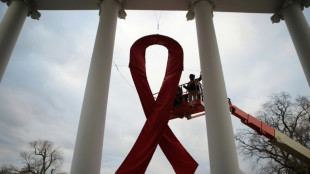

'Organs failing': Russian activist's poisoning ordeal
When Natalia Arno stands up for any length of time, her right side goes numb, as do her back and her face.
That's because five months ago, she was poisoned, the activist told AFP in an interview in Paris.
The 47-year-old president of the Free Russia Foundation, an NGO, was in Prague when she noticed that something was wrong.
"The door to my room was ajar," she told AFP. "I immediately noticed a very strong, very unpleasant smell in the room. A fragrance, like something had been sprayed there".
She started looking for hidden microphones but then stopped, feeling silly for worrying.
As it turned out, she hadn't been paranoid.
At five in the morning, she woke up with a piercing pain in her mouth.
Alarmed, she booked a flight to the United States, where she lives, and an appointment with her dentist.
On the plane crossing the Atlantic, the pain spread to her armpits, chest, ears, eyes and legs.
"It was like all my organs were failing me," she recalled.
Tests showed that Arno had been exposed to a synthetically produced nerve agent. "My nerves were burned," she said.
Authorities in the United States and Germany -- where Arno spent time before going to Prague -- launched an investigation into suspected poisoning.
An exiled Russian journalist, who had been with Arno in Berlin for a meeting with opposition businessman and activist Mikhail Khodorkovsky, also fell sick.
Arno was diagnosed with polyneuropathy, a condition affecting many nerves in different body parts.
- 'We are efficient' -
It was the same condition that affected Vladimir Kara-Murza, an opposition figure who was in April sentenced to 25 years in jail for high treason after condemning Russia's invasion of Ukraine.
Kara-Murza's wife, Evgenia, told AFP he was poisoned twice, in 2015 and 2017, but survived against the odds.
Evgenia Kara-Murza said media investigations had established that the agents poisoning her husband were the same ones who had been behind the poisoning of Alexei Navalny with nerve agent Novichok.
Navalny, a key opposition activist, is serving a 19-year term for alleged extremism.
President Vladimir Putin's power is based on "aggression" and "intimidation", Evgenia Kara-Murza said.
"Without these methods of repression he would be nothing".
Her husband has been locked up in a penal colony in Siberia since September and kept in solitary confinement which in his condition is "illegal", she said.
But "for Russian authorities who torture people regularly, that word has no meaning", she said.
Amnesty International says that torture and ill-treatment are "endemic" in Russian prisons, in particular after the invasion of Ukraine, although this is denied by the Russian authorities.
Arno said that human rights activists are "like low-hanging fruit" for the Kremlin, which can reach them easily even in western countries with "its very long tentacles".
Attacks outside Russia, she said, prove that "we are efficient, we do something to irritate them".
Russia has always denied involvement in the number of high-profile poisonings against Navalny, Kara-Murza, double agent Sergei Skripal and other figures over the last years, although Western governments say evidence points very much to the contrary.
Arno said she had been the victim of harassment several times since leaving Russia "at gunpoint" in 2012, when FSB security service agents threatened her with decades in jail if she didn't go abroad.
When Arno and Evgenia Kara-Murza came to Paris for a forum with dozens of other Russian activists, the name of the restaurant booked for the event was kept secret until the last minute, and bottles had to be opened at the table, not before.
But "nobody was afraid", Olga Prokopieva, spokeswoman for the organising Russie-Libertes (Russia-Freedoms) NGO, told AFP. "They're not that easily stopped."
L.Amato--IM



